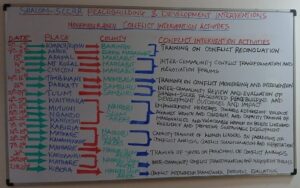By Mary Koech
The life of pastoralist communities is mainly nomadic where families move in search of better pasture and water for their livestock even if it is across international borders. The Turkana community of northern Kenya are mainly a pastoralist community where a major source of livelihood comes from their livestock. The month of April is a rainy season in Kenya, and Turkana County was blessed with rains changing the dry, rocky and dusty landscape to a lush green scenery.

Livestock at a water point. Livestock are main livelihood for pastoralists.
Neighboring communities like the Nyang’atom and Toposa from Ethiopia and South-Sudan, respectively share the same lifestyle. Scarcity of resources becomes a hub for conflict as the various communities are in pursuit of the depleted supply. This is usually heightened during drier seasons. It would be assumed that the rainy season would bring relief and therefore reduce the clashes experienced there. However, the rainy season also brings it challenges. During a recent (April) workshop conducted by Shalom in Koyasa, Northern Turkana, there was a raid conducted in the village of Lokamarinyang’, approximately 4 kilometers from where the workshop was being held in Koyasa. Other affected villages were Lopeat and Lomuria-alonyaman. The raiders attacked at night and stole 10 calves and 5 donkeys on 23rd April, 25 goats on 24th April and 60 cows on the 26th April, 2016. The theft of these animals was very painful for the Turkana family.
When pasture and water is readily available thefts still occur. Various reasons contribute to this twist of events:
- The young men who mainly conduct the raids and theft have no source of employment and when pasture is readily available, many are left idle. They then engage in such attacks because it gives them something to do.
- The cultural aspect where young men wanting to marry and who may not have cattle of their own may steal from other communities as a way of amercing wealth that would allow them to present as bride price.
These present challenges to the peace process. Therefore, there is continuous need to expand the training process conducted by SCCRR that will provide communities with long-term peace-building techniques but also allow them to create various income generating activities that could be adopted thereby giving them a sustainable livelihood.

